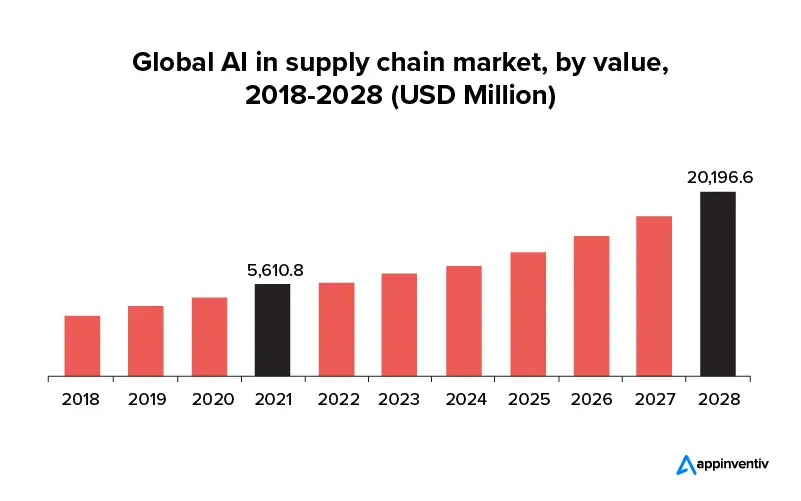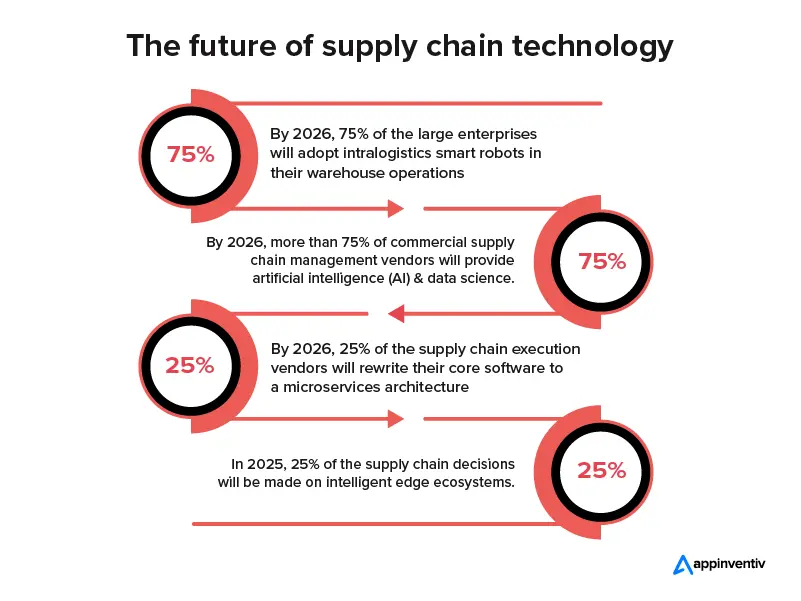- Problems in the current supply chain technology
- 1. Material and labor shortages
- 2. Increasing freight costs
- 3. Port congestion
- 4. Limitations in demand forecasting
- The most impactful set of information technology in supply chain management
- IoT
- Blockchain
- AI
- Robots and automation
- Cloud computing
- The trends of new technology in supply chain
- FAQs
Digitalization is visibly transforming almost every space, but perhaps the biggest impact that the concept is making is in the logistics and manufacturing sectors.
Standing on the edge of growing globalization, elevated product complexity, and ever-changing customer demands, companies are using an advanced set of technology in the supply chain to expand their business innovation.
The recent pandemic and war situations have brought an imbalance in the demand and supply of goods, thus affecting the supply chain technology globally. But these dire situations have also elevated the need for companies to embrace tech-led supply chain management solutions to handle the challenges, as the probability of lockdowns or another war can’t be overlooked.
With companies getting cautious about an unpredictable future, it is not surprising to see them investing in intelligent supply chain optimization technologies. According to Gartner, by 2023, 50% of global eCommerce companies will invest in AI, a real-time supply chain, and advanced analytical solutions.
An investment they want to make for solving the pestering issues of the global supply chain disruption.
Problems in the current supply chain technology
Even though the current economic situation accelerated the adoption of digitalization in the supply chain, it also brought several lacks on the surface. A revelation that forced pivotal roles of information technology in supply chain management.
1. Material and labor shortages
2020-21 saw multiple layoffs while quarantine put the global market in flux. Leaders are now not just facing delegation issues but are also finding it difficult to fill key positions in the procurement and supply chain ops roles.
According to the Institute of Supply Chain Management report, every crucial commodity – human and material – is scarce or expensive, leading to complexities and shortages in the industry. A shortage that calls for the inclusion of next-gen technology in supply chain management.
2. Increasing freight costs
In 2021, intermodal transport grew to a massive extent while the spot prices also doubled; for example, the price change looked like this – reefer (+25%), van (+18%), and flatbed (+27%). Moreover, the air and sea freight prices have also skyrocketed, making it challenging for companies to move freights at high capacity. This has led businesses to invest in high-end logistics and supply chain technology to find the most cost-effective solutions.
3. Port congestion
In the past two years, there have been long wait times for ships coming into ports around the world. Last year, in October 2021, more than 50 container ships got amassed just outside of Los Angeles and Long Beach for unloading cargo from China. Gridlocks like these, specifically at the overseas port, cause delays as the ships look at obtaining cargo. Such bottlenecks on both ends lead to additional time in importing-exporting operations, which disrupts the domestic supply chains.
While the congestion in ports is not a new issue, the National Customers Brokers & Forwarders Association of America (NCBFAA) predicts that 2022 might witness long wait times and supply chain blockages. And in response to this, we will see greater use of technology in supply chain management.
4. Limitations in demand forecasting
While the worldwide shutdown in 2020 affected the supplier network data, 2021 witnessed a sudden adoption of digitalization efforts. This resulted in zero benchmarks for the supply chain leaders to work around, thus leaving scope for the adoption of global supply chain technology.
With the unprecedented demand growing even today, addressing them continues to be an issue. To solve this, the leaders are relying on the present-day data to predict the year ahead and set benchmarks from inventory to pricing and budget.
So these are the top challenges that the supply chain industry continues to follow even after the COVID-driven digitalization. The solution to these lies in using a range of new technology in the supply chain. Let us look into them next.
The most impactful set of information technology in supply chain management

Technology in the supply chain is fast changing. What once used to be restricted to paperwork and excels is today using smart technologies like AI, Internet of Things (IoT) , Blockchain, RPA, etc., to make the processes efficient and transparent. Let us get down to the list of technologies and how they are helping to solve the challenges in supply chain management.
IoT
With IDC forecasting double-digit annual growth in global IoT spending in 2022, the supply chain industry is seeing a massive opportunity in the global supply chain technology, specifically in censored and connected things like shipping containers, goods, and warehouse stations.
It can be expected from manufacturers and transportation companies to spend on IoT deployments, specifically for supporting the manufacturing operations and management of production asset monitoring and management of freight fleet.
By enabling location tracking, monitoring the weather conditions, traffic patterns, etc., businesses will be looking at combining IoT and artificial intelligence in supply chain management for a range of use cases. For example, at the back of this information, the suppliers can reroute the delivery to a nearby distribution center or dispatch a repair crew to address issues in real-time.
If you are looking to understand IoT in supply chain in detail, check out our latest blog post on IoT In Logistics And Supply Chain – Benefits, Use Cases & Challenges
Blockchain

It will be impossible to talk about global supply chain disruption without talking about blockchain. The technology works on an immutable set of transactions, which is best suited for tracking the origin of goods and establishing trust in supplier information and supply chain processes.
Blockchain in supply chain management, at the back of its immutability factor, establishes the audit trail, which is much more efficient than traditional tracking approaches like email or book-keeping.
As a result of this, the biggest blockchain in supply chain example lies in enabling track-and-trace use cases that help businesses look into the chain of goods’ custody. This, in turn, helps find counterfeit items and fraud instances, highlight the at-risk suppliers, ensure that the regulatory requirements are met, and build transparency around the origin and goods’ movement. All of this makes blockchain technology in the supply chain one of the most profitable investments in the domain.
[Also Read: How can blockchain be used to strengthen the medical supply chain]
AI

Every modern supply chain network comes with a massive range of data which helps unlock insights into the otherwise complex global supply chain technology.
By incorporating a combination of technology in supply chain management and logistics like AI, predictive analytics, and machine learning, companies are able to automate their warehouse operations, better their delivery times, manage inventory proactively, optimize the sourcing relationships, and build new experiences which better users’ satisfaction and increase sales.
Using predictive methods and algorithms of artificial intelligence in supply chain, businesses are able to use large data sets and get insights on a microscopic level – all with almost zero human involvement. This is one of the biggest reasons why businesses are using AI as a key supply chain and logistics technology.
Robots and automation
Robots have forever played a key role in supply chain technology. It has been used by the industry for moving materials in the warehouse and for order fulfillment processing. However, as AI pushes the technology to a greater level of sophistication, the machines will now be able to own up to the manual human-driven tasks from picking and packing orders to automated supply chain technology.
The combined capability of humans and robots is leading to large-scale deployments all through automated supply chain management solutions. According to IDC, 65% of the warehouse activities will be using situational data analytics and robots by 2023 to then aid with the optimization of storage, growing the warehouse capacity by more than 20% and lowering the work order processing efforts by half.
Cloud computing

As the supply chain generates massive amounts of data on a year-on-year basis, AI-powered clouds are being used by businesses to convert that dataset into insights. Cloud computing, when incorporated with artificial intelligence in supply chain management, holds the ability to transform the operations of the supply chain and grow its complexity-managing capabilities.
The impact of technology in supply chain management can be best seen in bringing the Cloud and AI systems together, which makes use of the market indicators and past trends to achieve the following processes:
- Powering of the automation process
- Bettering the supplier selection procedure
- Getting real-time data on shipments
- Analyzing the carrier performance
- Streamlining of the supplier onboarding process
- Anticipating the operational issues and trends
- Augmentation of customer support
The addition of these technologies in the supply chain domain is leading to a situation where businesses are able to predict demand, make the supply chain process transparent, and lower the delivery timelines. An event that has led to multiple trends showcasing the impact of technology in supply chain management.
Let us look into those supply chain technologies trends as we conclude the article.
The trends of new technology in supply chain
Supply chain disruption is impossible to ignore. The way the industry has shifted in the pre and post-COVID era is remarkable. With technologies like artificial intelligence in supply chain, IoT, cloud computing, robotics, and blockchain in supply chain management marking their entry more prominent in the sector, we are only a few steps behind the complete global digitalization of supply chain.
Here are some trends that Gartner identified in their ‘Supply Chain Digital Transformation’ report.

These supply chain disruption trends that we saw above are only the surface-level transformation that the space is about to witness in the coming years. With the growing adoption of next-gen technologies in the domain, we will soon enter a time where businesses, especially manufacturing and logistics, will become more efficient.
For the goods-driven sector, it becomes crucial to invest in the right set of technologies – something that supply chain app experts like Appinventiv can help with. We carry extensive experience in digital transformation IT services and engineering around building supply chain solutions.
Our team of development experts understands the ins and outs of incorporating next-gen technologies like AI, blockchain, IoT, and robotic process automation – a specialty we use to transform supply chain processes of multiple industries.
Recently, we worked with a global manufacturer of heavy construction and mining equipment on an intelligent supply chain software which helped them become more responsive towards their client’s needs. Moreover, the process automation facility we added allowed their employees to put their efforts on other aspects of the job instead of mundane activities, thus increasing their productivity and efficiency.
Now that you know how technology in supply chain management can solve pertinent challenges, get in touch with us today and initiate your supply chain journey.
FAQs
Q. How does technology help in supply chain?
A. The following are some ways that technology in supply chain management comes with several perks:
Real-Time Visibility: Supply chain managers may receive real-time visibility into the movement and status of items, thanks to cutting-edge monitoring technologies like RFID and IoT. This enables better planning, decision-making, and reaction to any disruptions.
Automation and Efficiency: Technology makes it possible to automate many activities, including inventory control, order processing, and logistics, which increases productivity and lowers mistake rates.
Data Analytics and Insights: Technology makes it possible to collect and analyze enormous volumes of data, which gives organizations the ability to learn important things about the functioning of their supply chains, spot bottlenecks, plan out routes more efficiently, and make informed decisions.
Demand Forecasting and Inventory Management: Technology aids in precise demand forecasting, inventory optimization, stockout prevention, and carrying cost reduction through data analysis and predictive algorithms.
Enhanced Order Tracking: Technology makes it possible for real-time updates, individualized customer interactions, and enhanced order tracking, which improves the entire customer experience and satisfaction.
Communication and Collaboration: Technologies like cloud-based platforms and collaborative software improve coordination and communication among various supply chain players, enabling seamless collaboration.
Q. How does technology affect supply chain management?
A. Technology has revolutionized supply chain management by automating processes, improving visibility, enabling real-time data analysis, enhancing communication, and optimizing decision-making. This streamlining of operations increases efficiency, reduces costs, enhances collaboration, and improves customer satisfaction.
As a result, businesses can achieve a more agile, resilient, and competitive supply chain ecosystem. Embracing technology in supply chain management is crucial for staying ahead in today’s fast-paced business environment. Consider integrating technology solutions into your supply chain to unlock these benefits and drive success. Connect with a leading professional IT consulting services provider to get the best consultation on embracing technology for your supply chain business.



How Digital Transformation is Shaping the Next Era of Construction
The construction industry, traditionally slow to adopt new technology, is now actively embracing digital transformation, marking a significant shift towards modernization and increased productivity. This change is all about adopting new solutions that enhance efficiency, safety, and project management, offering significant benefits to businesses. While the complexity of construction projects and coordination among multiple parties…

How Digital Twins Act as Key to Smarter and More Agile Manufacturing Processes - 10 Use Cases and Examples
Tapping into the potential of digital twins in manufacturing, businesses today are creating a transformative virtual, real-time counterpart of physical systems, making it easier to monitor, assess, and optimize their manufacturing operations. McKinsey highlights the value of this approach, pointing out how “a company with a robust digital-twin platform can conduct comprehensive full-product simulations in…








